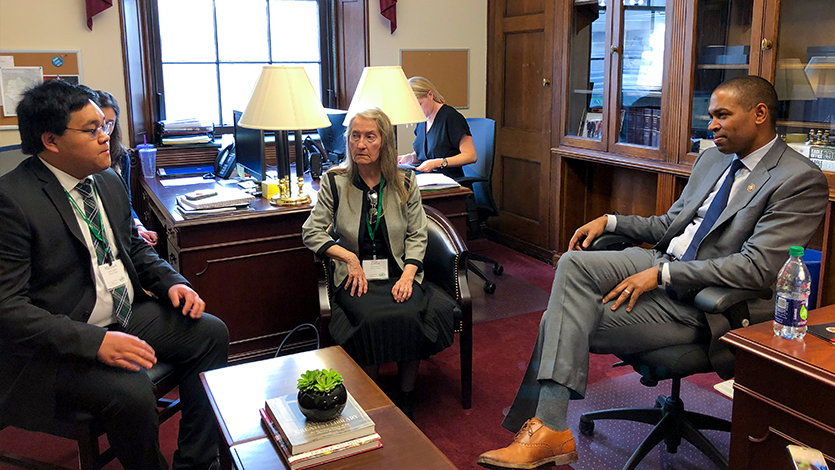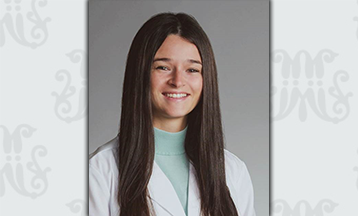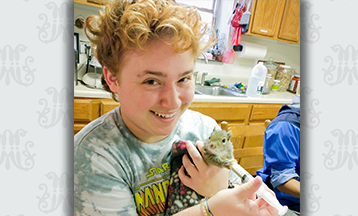-
About
Marist Commencement
Celebrating the Class of 2025
• The graduate ceremony will be held on Friday, May 23.
• The undergraduate ceremony will be held on Saturday, May 24.About
-
Academics
Marist Commencement
Celebrating the Class of 2025
• The graduate ceremony will be held on Friday, May 23.
• The undergraduate ceremony will be held on Saturday, May 24.Academics
-
Admission & Financial Aid
Marist Commencement
Celebrating the Class of 2025
• The graduate ceremony will be held on Friday, May 23.
• The undergraduate ceremony will be held on Saturday, May 24.Admission & Financial Aid
-
Student Life
Marist Commencement
Celebrating the Class of 2025
• The graduate ceremony will be held on Friday, May 23.
• The undergraduate ceremony will be held on Saturday, May 24.Student Life
- Athletics
Image of Matthew explaining

Matthew Badia
Pawling, NYAcademic School
ScienceCampus
New YorkMatthew Badia ’21 was one of about 70 college and university students from across the nation selected to travel to Washington, DC recently as part of the 23rd Annual Posters on the Hill event. Sponsored by the Council on Undergraduate Education with support from the American Chemical Society and Institute of Electrical and Electronics Engineers-USA, Posters on the Hill showcases the work of undergraduate researchers to members of Congress, Congressional staffers, federal government officials, academics, and others. The students’ research projects go through a rigorous, highly competitive review process and represent the best from around the nation. By presenting their outstanding work, Badia and his fellow students called policymakers’ attention to a range of serious issues and made a strong case for continued federal investment in undergraduate research.
Badia, from Pawling, New York, is a chemistry and environmental science double major and a member of Marist’s Honors Program. Only the second student in college history to present at Posters on the Hill, his research is based on work he began in high school as part of a program sponsored by the State University of New York at Albany. It was through this program that Badia first met Associate Professor of Environmental Science Zofia Gagnon, who would go on to be his research supervisor at Marist and accompany him to Washington, DC. Gagnon’s mentorship of his research, along with the beautiful campus (he reports that he “fell in love with it”), convinced him that Marist was the place for him.

Badia’s multi-year study has focused on the presence of pharmaceutical runoff in the Hudson River and its effect on plant and animal life. Specifically, he has exposed crayfish, arrow arum (an aquatic plant), and hydroponic tomatoes to water from the Hudson River containing pharmaceuticals in order to observe the effect. The pharmaceuticals tested over a period of 18 days were amphetamine, fluoxetine, and triclosan, and the findings have been startling. Badia reports that his research showed “significant structural damage to both plant and animal tissue after two weeks. In crayfish, we observed liver tumor growth and fatty acid accumulation. These structures in crayfish are analogous to those of humans, so it’s very concerning.” Badia notes that this research is significant because, while the Clean Water Act produced many improvements in the Hudson River, “aging sewage treatment infrastructure and the rapidly increasing use of pharmaceutical and personal care products (PPCP) are creating new problems.”
The chance to share his research findings on Capitol Hill with lawmakers, government officials, and other policymakers was a one-in-a-lifetime opportunity for Badia, who presented his research in a private meeting with US Representative Antonio Delgado. “It felt great to share what we’ve discovered in the Hudson River directly with a member of Congress, who is in a position to act on that information and help our local environment.”
When Badia is not playing alto saxophone in the Marist Band, he is thinking about his future. He recently received a Tibor T. Polgar Fellowship from the Hudson River Foundation, so he’ll spend this summer continuing his research on the Hudson River. Looking further ahead, Badia notes, “I want to get my PhD in environmental chemistry and eventually work in academia.” As someone with both a passion for research and firsthand knowledge of the positive impact of importance of faculty mentorship, his future students are sure to benefit.



